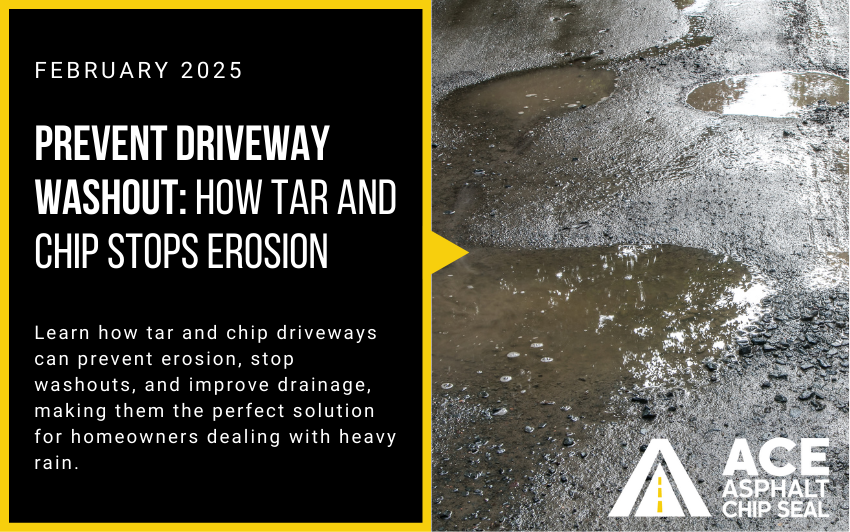Driveway Erosion Control
Driveway erosion is a common issue for homeowners, especially in areas prone to heavy rainfall and sloped areas. Unpaved surfaces like gravel driveways often suffer from water runoff and soil displacement, leading to costly repairs. Tar and chip driveways offer an effective solution by creating a durable, water-resistant surface and preserving the base below. This method not only prevents erosion but also enhances driveway longevity.
The Erosion Problem: Water Runoff Solutions
Heavy rain and poor drainage can wreak havoc on unpaved surfaces and even paved surfaces that weren’t designed with water in mind, causing driveway washout and soil erosion. These issues are particularly challenging on sloped properties where water flows with greater force. Homeowners frequently ask, “How can I stop my driveway from washout in the rainy months?” Tar and chip driveways with a diligent runoff plan will offer a reliable solution to address these concerns effectively.
Understanding Tar and Chip: What is a Tar and Chip Driveway?
Tar and chip driveways are constructed by applying a layer of hot liquid asphalt (tar) onto a prepared surface, followed by a layer of crushed stone or aggregate. This combination is compacted to create a durable, textured finish that resists water runoff and improves traction. The process is cost-effective and requires minimal maintenance compared to other paving methods.
Benefits of Tar and Chip for Erosion Control
- Surface Sealing: Best Way to Seal Gravel Driveway
The tar layer acts as a water-resistant barrier, sealing the surface and preventing rainwater from penetrating and displacing gravel or soil. - Improved Drainage: How to Improve Driveway Drainage in Rainy Weather
Proper application of tar and chip aids water runoff by creating a slightly sloped surface that channels rainwater away from vulnerable areas. - Durability in Extreme Weather: Driveway Material That Withstands Heavy Rain
Tar and chip driveways withstand heavy rainfall and temperature fluctuations better than gravel or traditional asphalt. Their textured surface minimizes pooling and enhances traction during wet conditions.
Tar and Chip vs. Other Erosion Control Methods
Compared to gravel, asphalt, and concrete, tar and chip is a cost-effective solution for long-term erosion control. While concrete offers durability, it is far more expensive. Gravel is cheaper initially but requires frequent maintenance to address washouts.
Maintenance Tips for Tar and Chip Driveways: How to Maintain a Tar and Chip Driveway
To maximize the lifespan of a tar and chip driveway, regular maintenance is essential:
- Clean Debris: Keep the surface free of leaves, dirt, and debris that can block drainage.
- Repair Cracks Promptly: Address small cracks and potholes early to prevent them from worsening.
- Snow Removal Care: Avoid using sharp tools that can damage the surface during winter months.
Case Studies: Successful Erosion Control with Tar and Chip
Many homeowners on sloped properties have seen dramatic improvements after switching to tar and chip driveways. For instance, one Tennessee property suffering from severe erosion saw a significant reduction in washout after installing a tar and chip driveway, highlighting its effectiveness as a driveway surface protection method.
Residential Drainage Strategies
Tar and chip driveways provide an affordable, durable, and effective solution for driveway erosion control. By sealing surfaces, improving drainage, and withstanding extreme weather, they help homeowners manage water runoff and maintain their driveways for years to come.
If you’re ready to protect your driveway from erosion, contact Ace Asphalt Chip Seal today to learn more about our tar and chip solutions!
